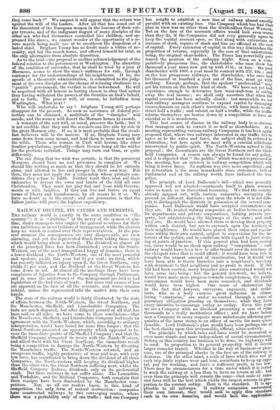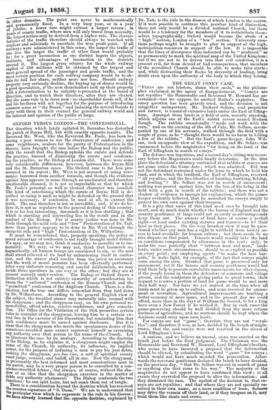RAILWAY DECLINE, ITS CAUSES AND REMEDIES. LEE railway world is
exactly in the same condition as "the country " ; it is "drifting," at the mercy of the system of rou- tine, under managers who employ the general resources for their own ambitions, or in set fashions of management, while the electors keep no watch or control over their representatives. At the pre- sent moment the consequences are very disagreeable, are even alarming, and yet the represented flinch from taking those steps which would bring about a revival. The dividend on almost all of the principal lines has been diminished ; even on the South- Western, one of the most tranquil and happy of domains, there is a lower dividend ; the North-Western, one of the most powerful and opulent, yields this year but 31 per cent ; its rival, which has recently inflicted an injury upon it, the Great Northern, only yields 31 per cent, and, the dividend on the Great Western has come down to nil. At almost all the meetings there have been complaints of injustice done to the Company through Parliament, and in some the misfortunes of the management are laid to bad legislation or the bad state of trade. But more real causes of loss are apparent on the face of all the accounts, and worse remains behind, unless the represented take the matter into their own hands.
The state of the railway world is fairly- illustrated by the state of affairs between the North-Western, the Great Northern, and the Manchester, Sheffield, and Lincolnshire Companies. The facts are much disputed, but after diligent perusal of all that has been said on all sides, we have come to these conclusions—that the Manchester, Sheffield, and Lincolnshire Company had made an agreement with the North-Western, which, according to ordinary interpretation, would have lasted for some time longer ; that the Great Northern presented an opportunity which appeared to fa- vour the immediate profits of the Sheffield Company ; and that the Sheffield Company abrogated its treaty with the North-Western, and allied itself with the Great Northern, the immediate result being a competition to damage the North-Western by diverting the Manchester traffic. The North-Western retorted, and an overgrown traffic, highly productive of wear and tear, with very low fares, has contributed to bring down the dividend of all three Companies, the North-western still keeping, its dividend higher than the other two, the Great Northern suffering next, whilst the Sheffield Company declares dividends only on its preferential stock. But these railways do not suffer alone. The Lancashire and Yorkshire, and the Midland Companies, both complain that their. receipts have been diminished by the Manchester corn- petition. Nor, as all our readers know, is this kind of oompeiation the only form of mutual destruction: companies hove constructed railways by two converging routes, where thae WaS a probability only of one traffic ; and one Company has sought to establish a new line of railway almost exactly parallel with an existing line. One Company which has had that plan in view was no other than the dividendless Great Western. But on the face of the accounts affairs would look even worse than they do, if the Companies did not very generally agree to keep the capital account open so that along with extensions or increase of stock, repairs of stock and line are effected at the cost of capital. Every extension of capital in this wal diminishes the proportion of returns, especially in the case of that unfortunate being, the original shareholder. The Times has powerfully por- trayed. the position of the unhappy wight. Even on a com- paratively prosperous line, the shareholder who once drew his thousand a year must now put up with 3751., or less : the poor shareholder with 100/. a year must be content with 371. 10s. ; and on the less prosperous railways, the shareholder, who once had his thousand or hundred a year out of the line, must go with nothing. Except, perhaps, that the opulent "preferential" may get his return on the bettor kind of stock. We have not yet had experience enough to determine how wear-and-tear is eating away the real income ; we shall only ascertain that when the capital account has been actually closed ; but meanwhile we see that railway managers continue to expand capital by damaging encroachments on each other's territories, with lines made to ab- stract half a traffic ; and subsist on half a traffic while the traffic returns themselves are beaten down by a competition in fares as suicidal as it is murderous.
This last source of disease in the railway body is so obvious that managers seek to correct it as well as shareholders. At a meeting representing various railway Companies it has been again proposed that, where two railways interested in one traffic fail to agree as to the rates and fares, the subject shall be referred to arbitration ; but here again Nire meet with a suicidal selfishness uncorrected by public spirit. The North-Western agreed to thi,s proposal ; the dissentients are the Great Northern and the Shef- field Companies. A reason can always be found for any policy, and it is objected that "the public," which was not represented at this meeting, has an interest in railway competition which will bring it lower fares. No sophism was ever more superficial ; and its reiteration is the more remarkable since statesmen' both of Parliament and of the railway world, have indicated the true policy.
The principle of Lord Dalhousie's bill—which was generally approved but not adopted—commends itself to plain common sense as much as to theoretical reasoning. We find the country already mapped out, with various companies occupying the ground in different districts ; and upon the whole it is not diffi- cult to distinguish the districts in possession of the several com- panies. Lord. Dalhousie would have accepted circumstances as they are. He treated railway companies as bodies between pub- lic departments and private corporations holding private pro- perty, but administering the highways of the state ; and such they are. He would have allowed them to develop their property within each district, but not to encroach upon the territory of their neighbours. He would have placed their rules and regula- tions within their own control, subject to supervision for the in- terests of the public and to conditions with regard to joint work- ing at points of junction. If this general plan had been carried out, there would be no check upon railway " competition" : each railway would have been free to offer transit over its territory at the cheapest rates that it could afford ; it would have been free to complete the utmost amount of ramification, but it would not have been able to throw branches into a neighbour's territory with detriment to that neighbour and no profit to itself. If this bill had been carried, many branches since constructed would not have come into being ; but the general net-work, we believe, would have made more progress towards completeness, the public convenience would have been more consulted, and dividends would have been higher. One cause of obstruction lay in the fact that lawyers, surveyors, engineers, and archi- tects, who as a body exercise great influence in stimu- lating "enterprise," are under no control through a sense of pecuniary obligation pressing on themselves ; while they have every incentive to encourage outlay as outlay. Even this year we see a Company with no dividend presenting a sum of some thousands to a really meritorious officer • and we have before seen a Company in many respects more unfortunate allowing per- quisites of the same stamp to an officer of merits far more ques- tionable. Lord Dalhousie s plan would have been perhaps one of the best checks upon this irreponsible, official, ultra-activity.
The principle by which rates and fares could be measured 1/3 even more simple and more independent of casual circumstances. So long as this country has business to be done, its highways will be used. In proportion to its general prosperity will it devote larger sumsofor transit. Whether in the way of business or plea- sure, one of the principal checks to the free use of the railway is dearness. On the other hand, a scale of fares which does not at each trip fairly replace wear and tear, contribute to keep up capi- tal, pay for working, and leave a sufficient profit, is too low. There may be circumstances for a time under which it is better' to work the railway at a loss than to have no return at all ; but even then the principle will remain the same—that scale of rates and fares will be the best which yields the largest returns in pro- portion to the current outlay. Here is the standard. It is ap- plicable to all railways. If railway companies understood their own interest, they would, seek to apply this standard each in. its own domains, and would hail the application' in other domains. The point can never be mathematically and, permanently fixed. In a very busy year, or in a year of jubilee, a lower fare might extract a larger return ; in years of scanty traffic, where men will only travel from necessity, the largest return may be derived from a higher rate. The charac- teristics of the traffic therefore should always be watched with candour and solicitude to ascertain the true profit point. If all railways were administered in this sense, the larger the traffic of one line the larger the traffic of other lines would probably ; for a great locomotion in one district begets the objects, instincts, and advantages of locomotion in the districts around it. The largest gross returns for the whole railway capital of 350 millions will be obtained by the largest and most general spread of the passenger and goods traffic, and the most certain position for each railway company would be to ob- tain its full fair share, neither more nor less. Should railway property very seriously decline, the buying up of shares would be a good speculation, If the new shareholders took up their property with a determination to be suitably represented at the board of direction, and to watch their directors, after they are elected. But the same rule is in force now : no shareholder needs sell, if he and his brethren will act together for the purpose of introducing common sense at "the Board," and inducing the several Boards to carry with them in their counsel the general railway world and the interest and opinion of the public at large.



























 Previous page
Previous page